10 best foods for a healthy gut
Make your diet healthier than ever with these naturally prebiotic and probiotic foods – your gut microbes will thank you for it
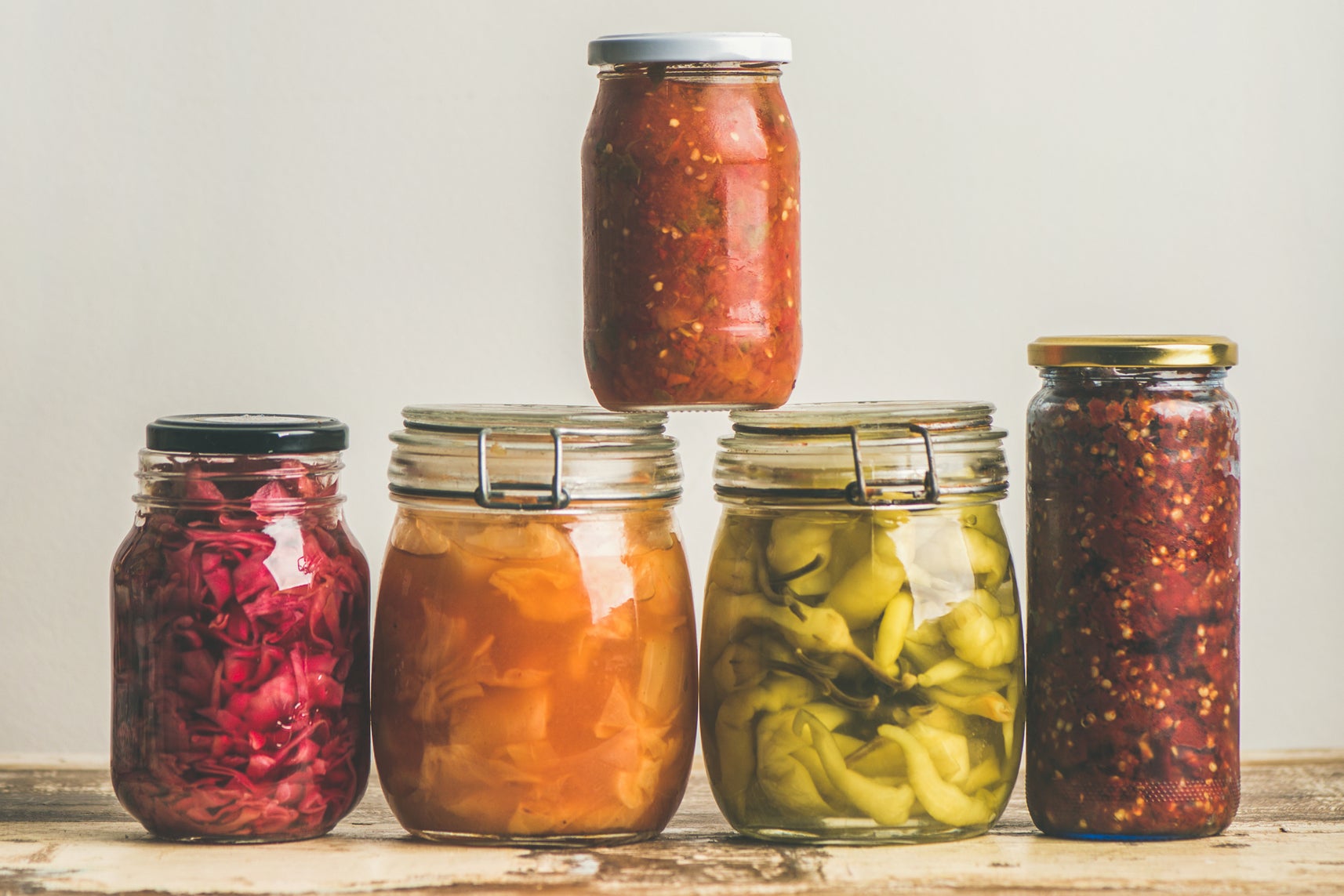
Your support helps us to tell the story
From reproductive rights to climate change to Big Tech, The Independent is on the ground when the story is developing. Whether it's investigating the financials of Elon Musk's pro-Trump PAC or producing our latest documentary, 'The A Word', which shines a light on the American women fighting for reproductive rights, we know how important it is to parse out the facts from the messaging.
At such a critical moment in US history, we need reporters on the ground. Your donation allows us to keep sending journalists to speak to both sides of the story.
The Independent is trusted by Americans across the entire political spectrum. And unlike many other quality news outlets, we choose not to lock Americans out of our reporting and analysis with paywalls. We believe quality journalism should be available to everyone, paid for by those who can afford it.
Your support makes all the difference.From sourdough bread to sauerkraut and kimchi, fermented food is one of the hottest health trends right now. Foodies and health-conscious people alike are becoming increasingly aware of the role of our gut microbes – collectively known as our microbiome – in improving not only our digestive health but our overall wellbeing, including mental health.
We can give our microbes a helping hand by eating a wide variety of fibre-rich foods – vegetables, fruits, nuts, seeds and pulses – called prebiotics, which feed them. And we can increase the population of our microbiomes by including probiotic foods, like yoghurt and other fermented products, which naturally contain healthy bacteria.
“The slow fermentation process involved preparing foods like sauerkraut and kimchi (usually raw cabbage or other vegetables, with salt and spices), and miso, allows time for a diverse population of healthy bacteria and enzymes to be produced,” explains Abbas Kanani, pharmacist at Chemist Click.
“A byproduct is lactic acid, which prevents harmful bacteria from colonising the intestines, as well as looking after the lining of the gut.” As the popularity of probiotic foods increases, so too does the range and quality. Supermarkets are getting wise to our wants and artisan producers are increasing their reach with online sales – all great news for our health and our taste buds. We reviewed some of the most appealing gut-healthy foods on offer, looking at price, availability, how natural they are and, of course, how palatable.
RAW Sauerkraut: £4.39 for 410g, Ocado
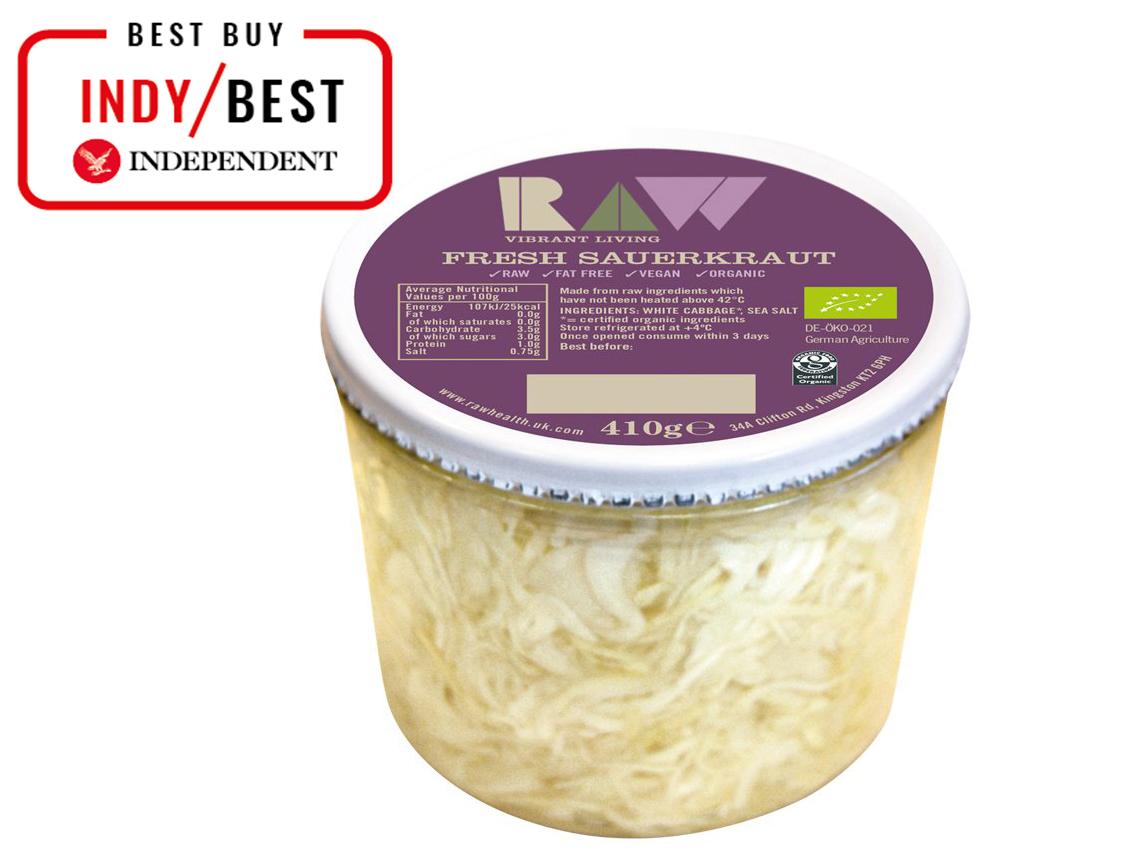
When it comes to pure, unadulterated sauerkraut, this tastes as good as it gets. Made with raw white cabbage, salt and nothing else, this is organic and unpasteurised and needs to be kept in the fridge (important, as products that don’t require refrigeration have been irradiated, which kills off the bacteria).
It lacks the overly vinegary taste you can get with some pickled veg. The cabbage is crunchy and not too wet, the taste is clean, fresh and piquant. We love this in salads, soups or just by the forkful, straight from the jar (to maintain high levels of bacteria, you should avoid cooking fermented vegetables or add it at the end). It may not seem cheap but there’s a lot of it, so the whole family can get their fermented fill. Tip: the metal lid is confusing at first – use a bottle opener to prize it off.
Cracking Kimchi: £6 for 220g, The Edinburgh Fermentarium
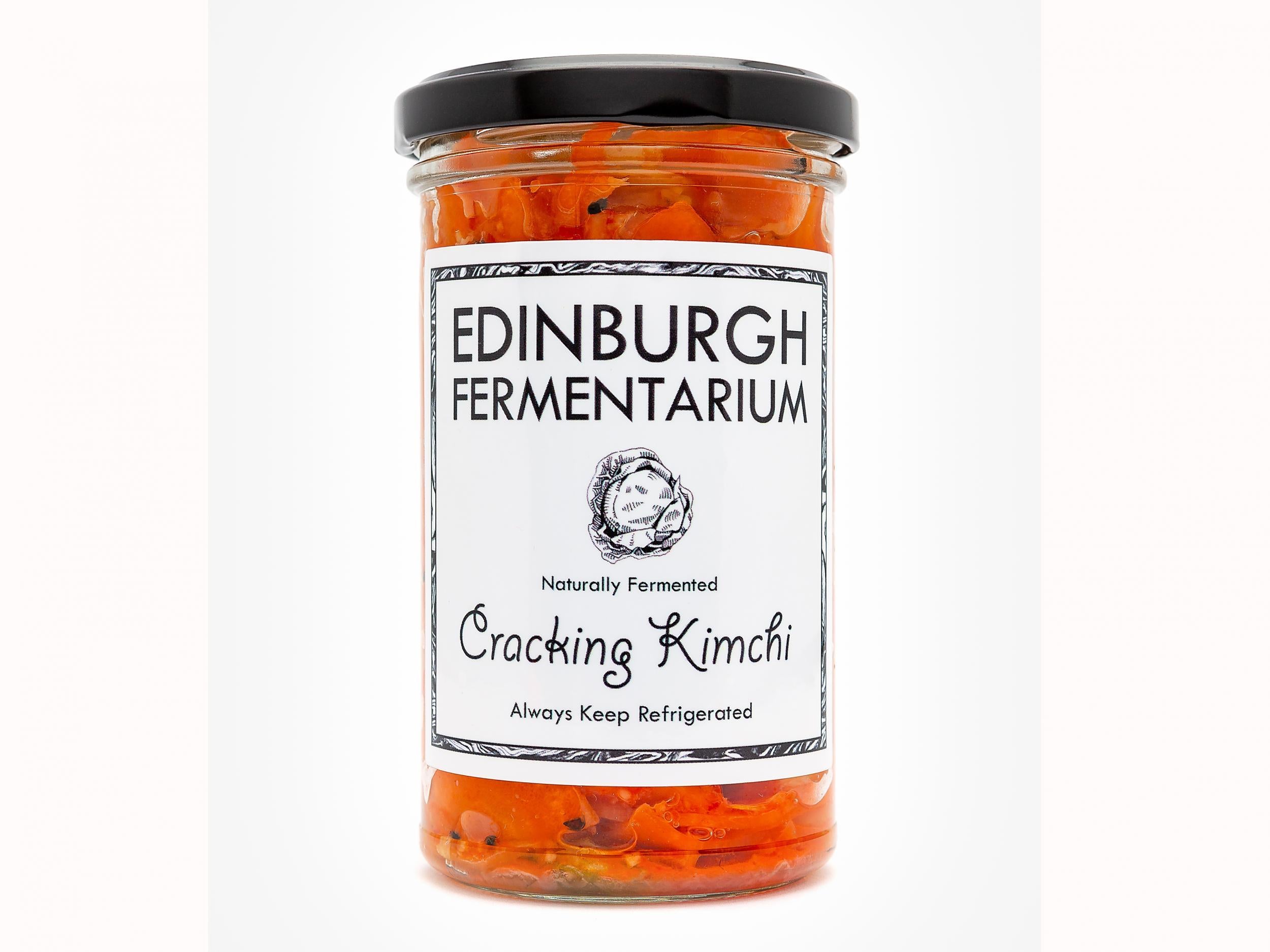
Another small-batch producer of krauts, kimchis, slaws and sauerkrauts, these condiments are all based on traditional recipes, but with a modern twist. The Cracking Kimchi is a Great Taste Award winner and a brilliant blend of chilli, ginger and other spices with Chinese leaves, cabbage, carrot, radish and bell pepper.
It taste fresh and piquant, spicy but not too hot or harsh like some Korean kimchis, as most of the heat seems to come from the ginger. Only certain products from the range are available at any one time, depending on what founder Ruth Munro has been busy fermenting. Everything is raw, unpasteurised, vegan, gluten, dairy and MSG free. Not the cheapest product on our list, but definitely worth a try for fermented foodies on the hunt for something new and interesting to serve up.
Glenilen Farm Rhubarb & Natural Live Yoghurt: 99p for 140g, Waitrose
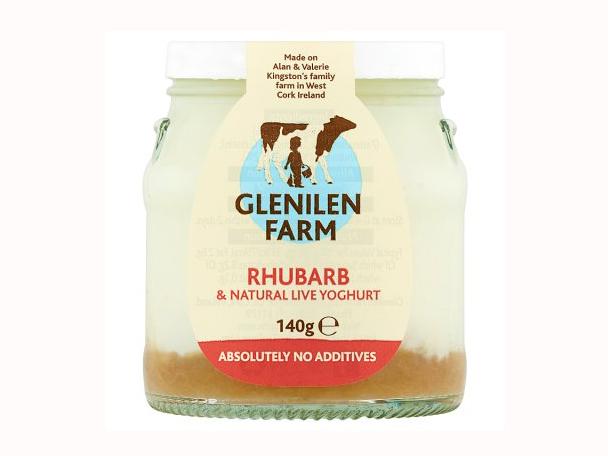
We loved this range of creamy, natural, probiotic and low-fat yoghurts – not least because they come in a small, recycled-glass jar. Over the past 10 years of trading, this has saved the equivalent of 100 tonnes of single-use plastic (plus the Glenilen Farm has lots of ideas on how to reuse the jars).
As for what’s within, these are inspired by natural yoghurt-compote pots in France and, with the exception of the natural option, are made up of a fruit layer at the bottom, topped with creamy live yoghurt, produced on a family run farm in West Cork. Of the six flavours the sharp, tangy rhubarb impressed us most – a pot would make a healthy pudding or breakfast but feels like a treat. While there are no additives, there is a little sugar added to the fruit varieties, so go for natural if you want to avoid this.
Bio-tiful Dairy Kefir Quark Cranberry & Chia: £1.45, Ocado
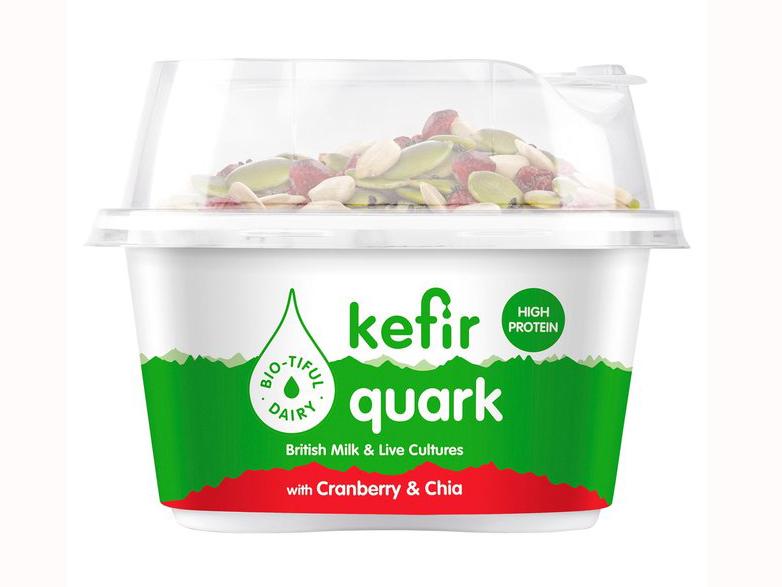
This snack pot of bio-live fresh cheese will appeal to anyone watching their weight or following a high-protein diet, as much as to those looking to boost their microbiome. It’s a unique combination made by fermenting skimmed Dorset milk with live kefir and quark cheese cultures. The result is a light snack, halfway between a cream cheese and thick yoghurt in texture, with a fresh, neutral flavour.
It could be spread on bread or crackers or enjoyed on it’s own – and comes with an optional topping of dried cranberries, chia and other seeds, and a disposable spoon. It’s low fat but high protein, providing over 21g per portion. As well as the billions of live bacteria, it provides calcium, vitamins B2 and B12 and phosphorus.
The Collective Kefir Cultured Yoghurt in Madagascan Vanilla: £2.29 for 450g, Waitrose
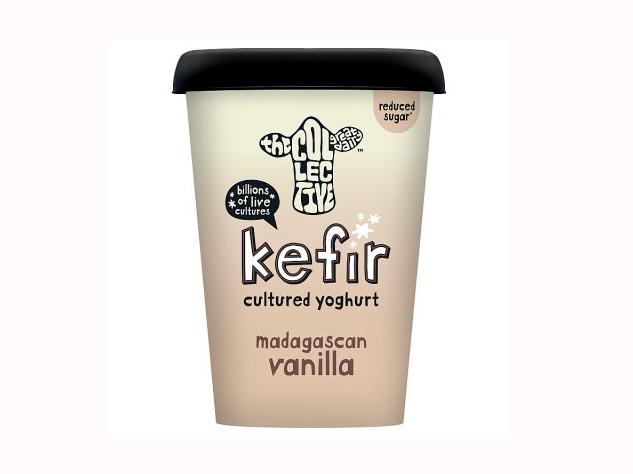
The Collective is well known for its live yoghurts and fruits, but fermenting with kefir grains takes them to the next, gut-healthy level. Kefir yoghurt boasts 13 different bacterial strains (as opposed to an average two to five in natural yoghurt) and is a thicker, more indulgent option to other brands of pouring kefir.
With 30 per cent less sugar than typical flavoured yoghurts, and then only sugars from milk, fruit or blossom honey, it’s a great option for anyone watching their sugar intake. It’s a good source of protein, calcium and vitamin B2. All four flavours in the range are delicious but the Madagascan Vanilla tastes particularly rich and luxurious, with a natural sweetness that cuts through the tartness of the kefir. Perfect for weaning kids off sugar and onto gut-healthy goodies instead – we could eat the whole tub in one sitting.
Green Goddess Raw Organic Cacao Powder: £4 for 250g, www.greengoddesswellness.com
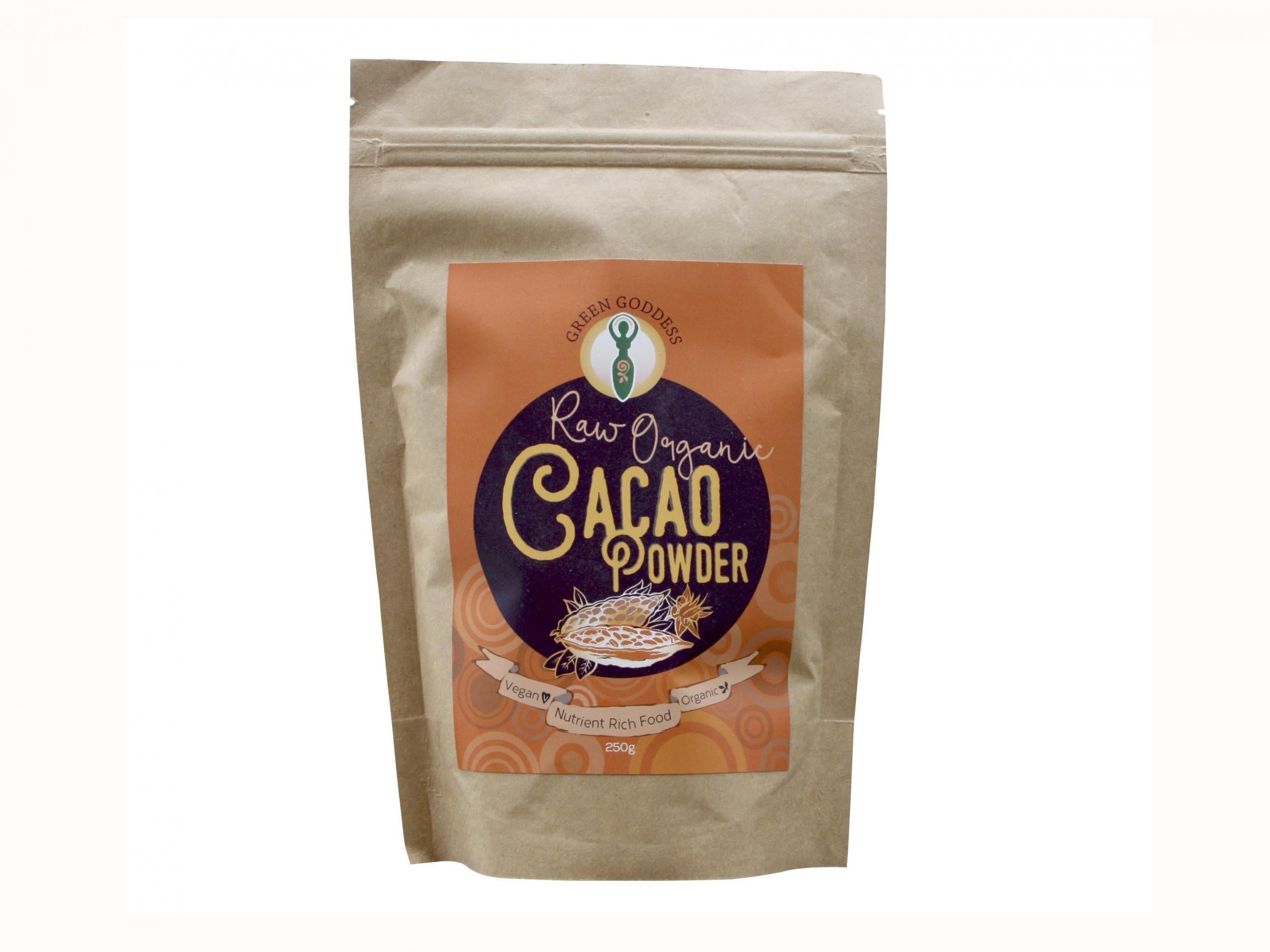
Hard to believe something that smells and tastes so chocolatey could be good for you – but this is. Raw cacao (aka unprocessed cocoa) is a prebiotic fibre, so it fuels the good bacteria in your gut to help rebalance digestive and overall health.
Research published in the American Journal of Clinical Nutrition showed volunteers consuming high-flavanol cocoa for four weeks had significant increases in lactobacilli and bifidobacteria in their guts. This organic cacao is natural and unprocessed and high in vitamins, minerals and antioxidants, including iron and magnesium.
A healthy and versatile store cupboard item, you can satisfy chocolate cravings (minus the processed ingredients) by adding a spoonful to smoothies, shakes, baking, puddings, yoghurt, porridge or hot water for a virtuous hot chocolate (we liked it with oat milk, too).
Clearspring Organic Japanese Brown Rice Miso: £2.79 for 150g, Holland & Barrett
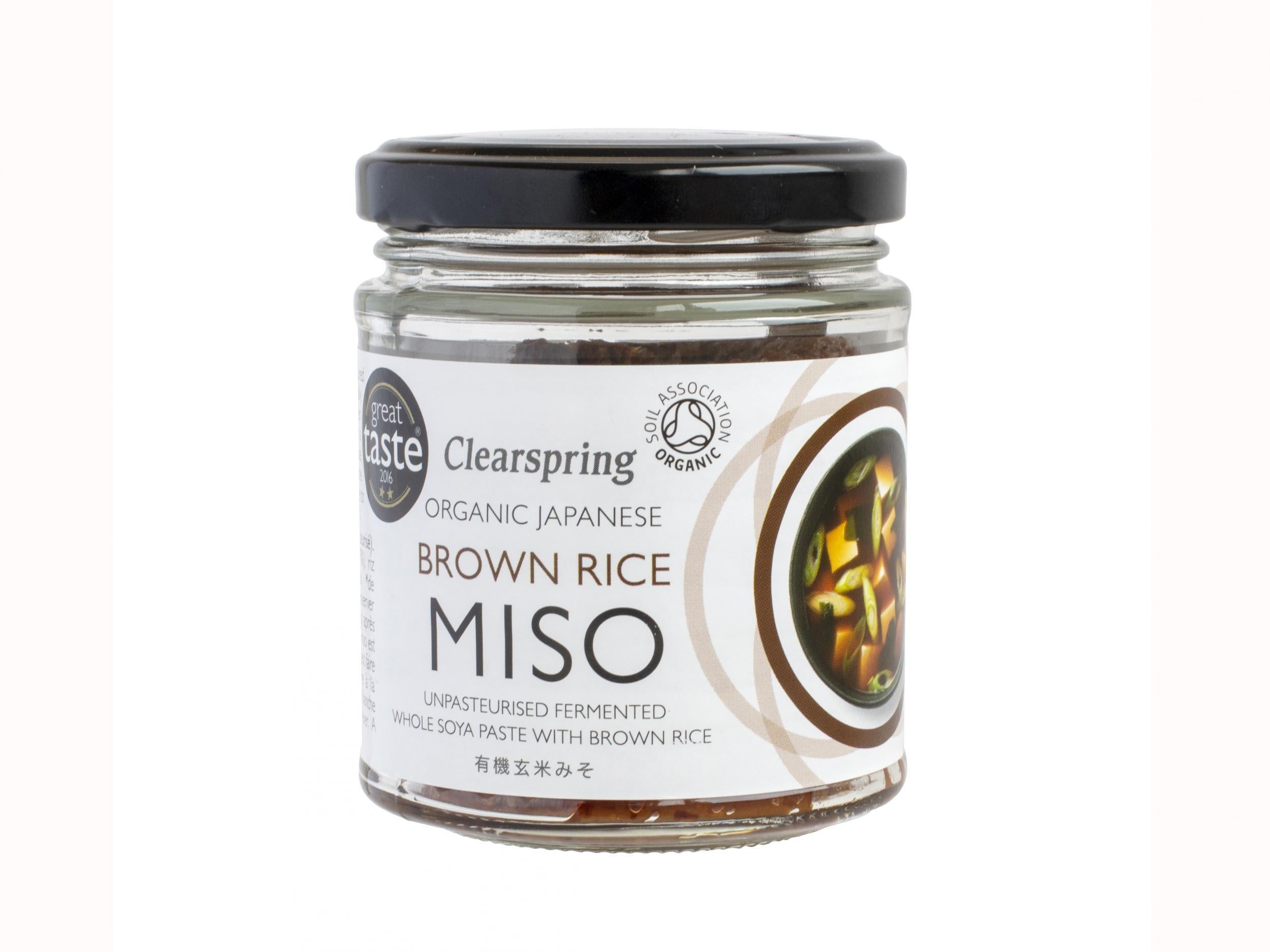
Miso is a traditional Japanese seasoning and used to make sauces, dressings, marinades and soups. Clearspring makes its version by fermenting soya beans, cereal grains (brown rice in this instance), a koji culture and sea salt in cedarwood kegs over many months. The resulting paste has a rich, salty and moreish taste.
It’s a perfect example of umami, the fifth taste, and deeper and more complex than many cheaper, more commercially produced misos. A little goes a long way – although you’ll soon be adding it to everything. Clearspring recently celebrated 25 years as a family business, producing its organic, vegan, authentic Japanese foods. All the products are GM-free and free of artificial additives, MSG, colourings, preservatives and added refined sugars.
Japan Centre Shiro White Miso: £2 for 300g, Japan Centre
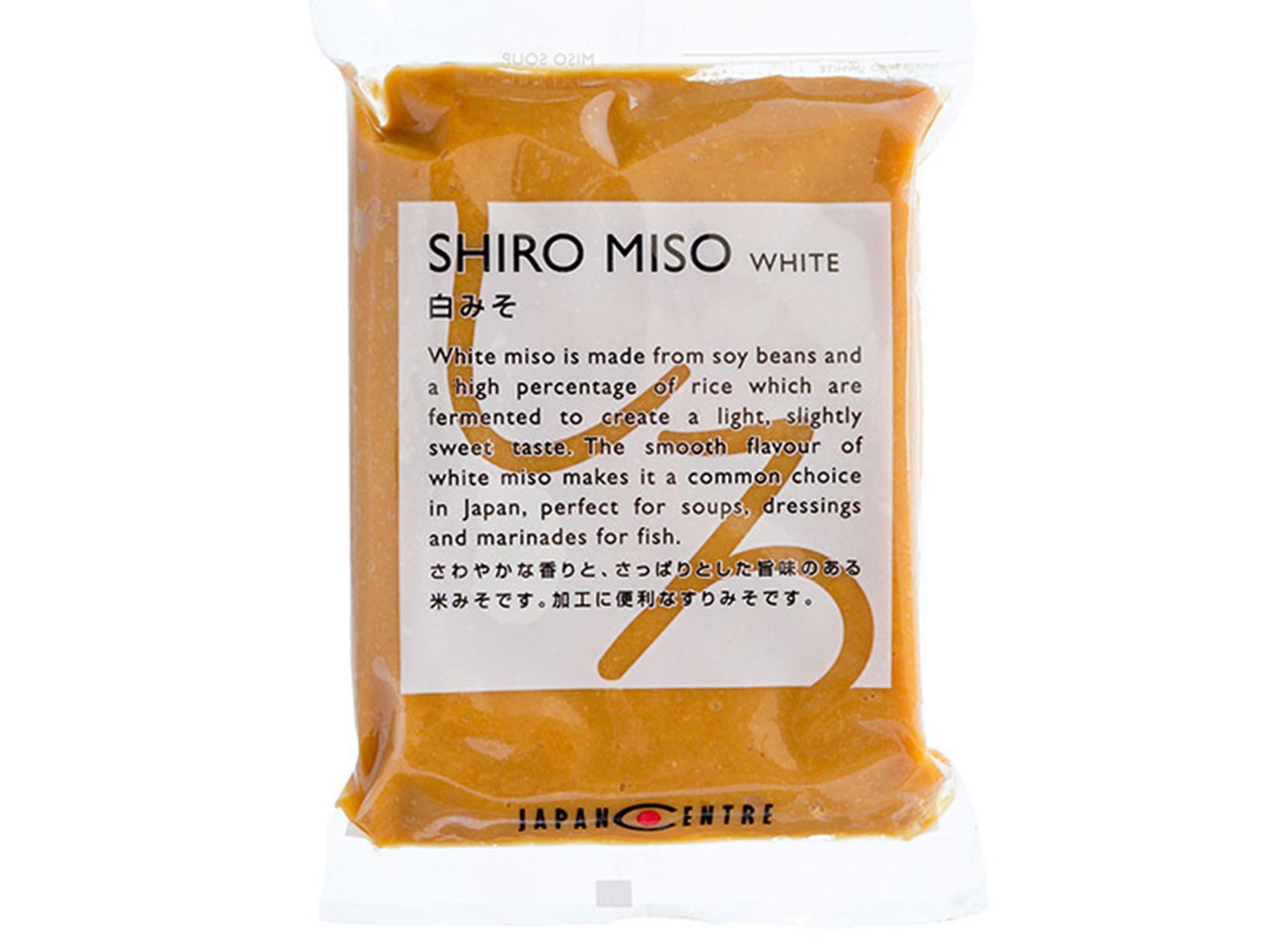
This is an affordable, own-brand miso from superstore of Eastern wonders the Japan Centre (pay it a visit if you’re in London’s Piccadilly). It’s made in Hiroshima with GM-free soya beans and a high percentage of white rice, which gives it a more subtle, sweeter flavour than darker misos.
A healthy fridge staple, white miso is well-suited to salad or vegetable dressings (experiment with adding white wine or rice vinegar, lemon, mustard, olive oil or soy sauce). It’s good mixed with dashi for a noodle soup base; excellent on white fish and tofu.
Osato Umai Ichiban Natto: £1.38 for 4 x 180g, Japan Centre
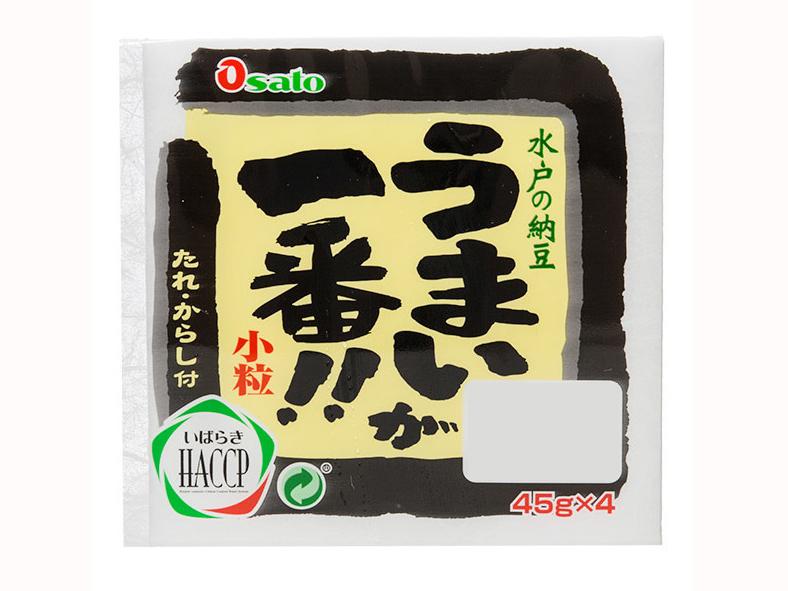
This is an acquired taste even in Japan. Like miso, it’s a savoury product made from soya beans that have been soaked, boiled or steamed, then fermented. But it has a much stronger taste – a little bit cheesy, a little bit musty – and pungent smell. Texture-wise it’s slimy and it looks and handles like a bowl of baked beans covered in sticky, stringy cheese.
It’s been called the Marmite of Japanese cuisine and it’s true to say you’ll either love or hate it. Once we got past the smell, we rather enjoyed the umami, cottage-cheese like flavour. If you do too, you’ll benefit from all the probiotic goodness inside, as well as protein, fibre and vitamin K2. This natto comes in a pack of four single-portion pots, with sachets of soy sauce and mustard to mix in if you want to. They’re delivered frozen and you need to consume them within a day.
Fermented By LAB Kraut/Kimchi Veggie Box: £24 for 6 x 170g jars, www.fermentedbylab.com
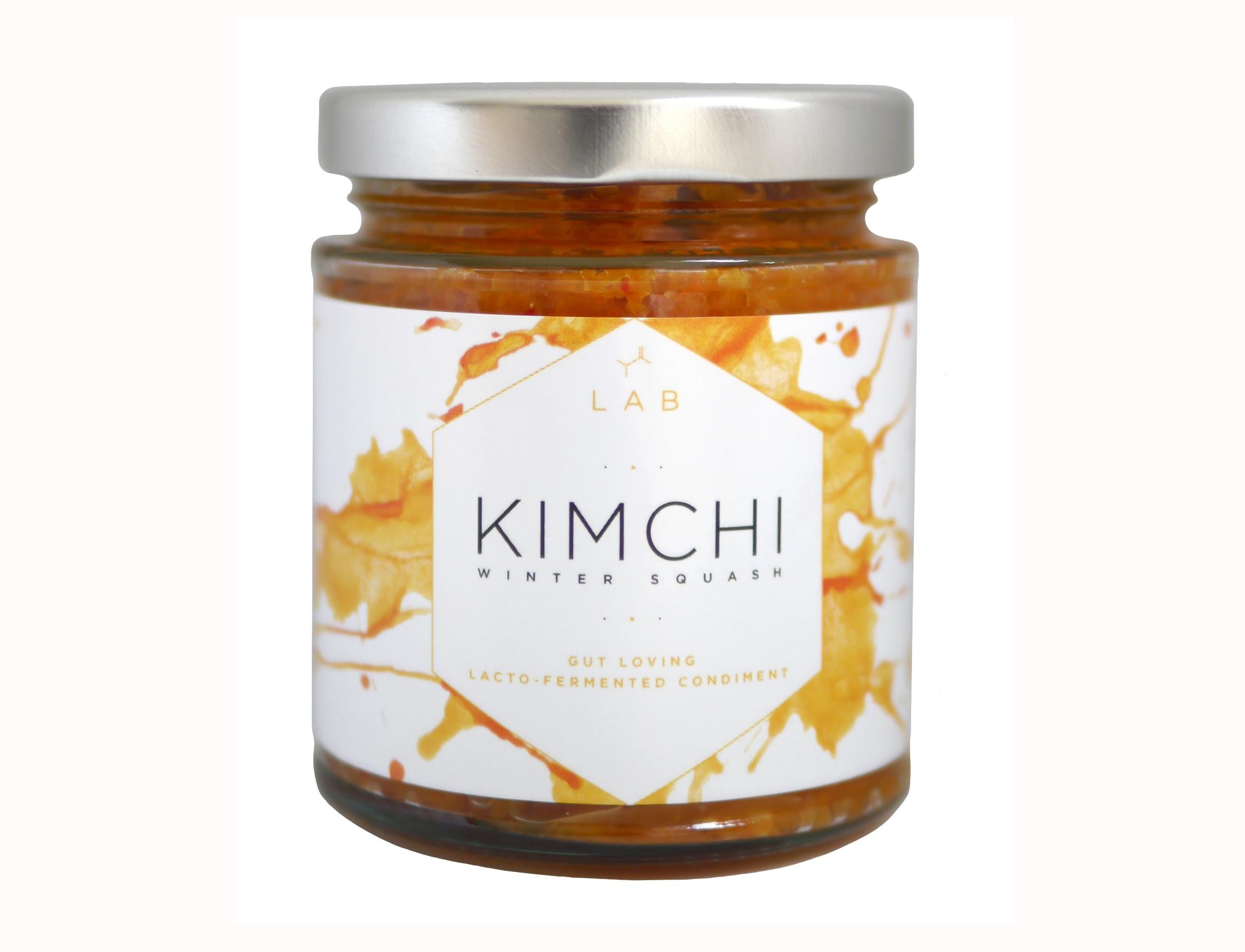
If you’re really into your ferments – and want them as natural and nourishing as they come – then you’ll love these hampers. They’re made by fermenting expert Alana Holloway, who learned to manage chronic, full-body eczema by nurturing her gut. She creates her organic, raw, unpasteurised products in her kitchen (the LAB in the name refers to Lactic Acid Bacteria, not a place!), using seasonal and largely British produce, and delivers throughout the UK.
Our favourite from the Autumn Collection was the zingy Ginger Beet Kraut, although the Winter Squash Kimchi has wonderfully warming kick, too. You can make a one-off purchase or set up a monthly subscription, and a box full of freshly made artisan krauts and kimchis will arrive on your doorstep, ready to fill your gut with its microbial goodies (you can also order kombucha and water kefir drinks).
The Verdict: Best foods for a healthy gut
If you want to make a big difference to your gut health, adding some sauerkraut to your meals is an easy, tasty way. And RAW is a well-priced, tasty, easily available version with a flavour that will enhance most dishes – good for kraut aficionados and newcomers alike. If dairy is more your thing, The Collective’s Kefir Yoghurt is a delicious way to pack in more healthy bacteria, ideal for nourishing fussy kids.
Hannah Ebelthite is co-author of bestselling gut-health book ‘The G Plan Diet’ (Aster, £12.99)